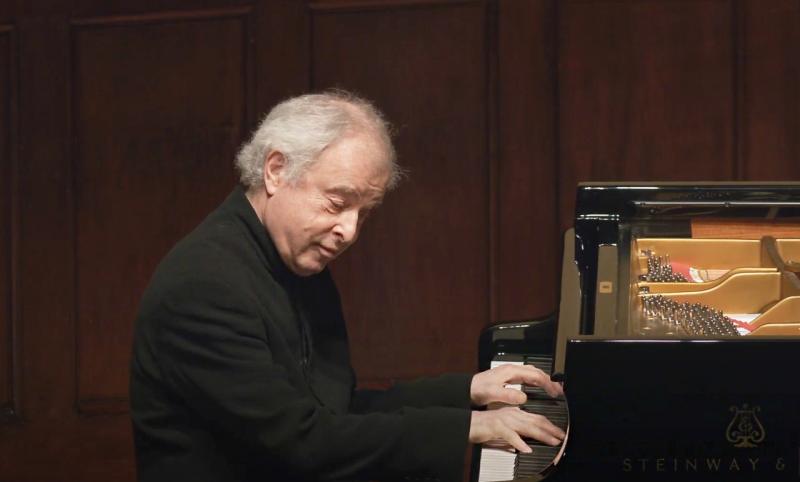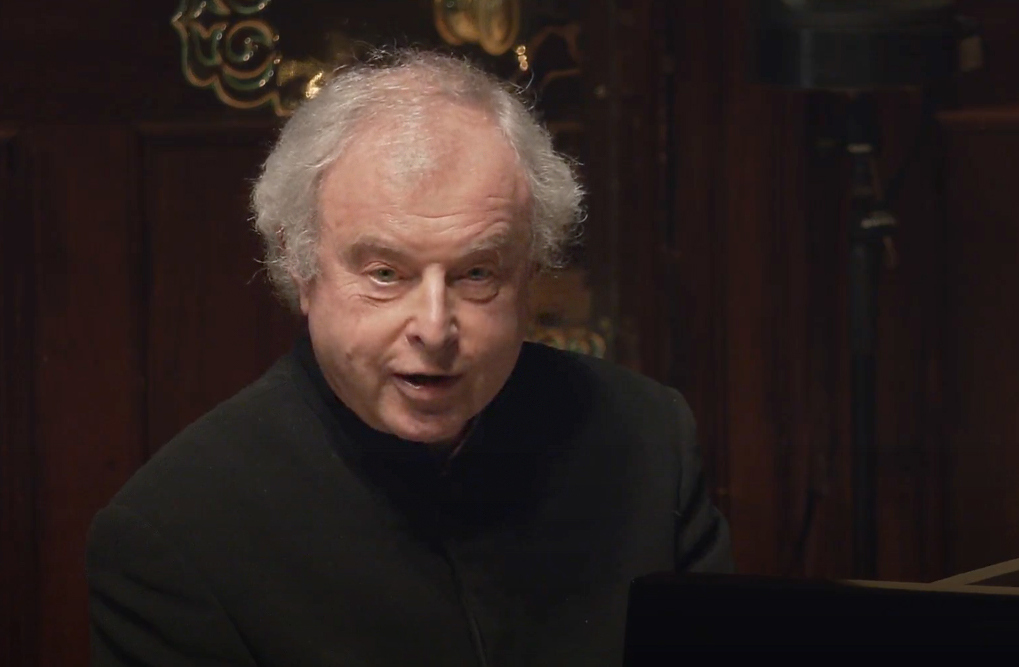András Schiff, Wigmore Hall review - Bach in isolation | reviews, news & interviews
András Schiff, Wigmore Hall review - Bach in isolation
András Schiff, Wigmore Hall review - Bach in isolation
Total focus on one composer brings balm for the spirit

Amid madness, fear and death, there is still an oasis in the music of Bach - and Bach played by András Schiff in the Wigmore Hall is a special type of haven. Normally one can’t get in to those concerts because they are instantly sold out, even though he usually does each one twice.
Playing into the empty cavern of the Wigmore’s auditorium - the hall that is usually his home from home - Schiff spoke to his invisible audience through the cameras, providing a guide to the pieces and a few quips besides. He chose an hour and half of Bach’s most pan-European pieces from the Clavierübung, including the Italian Concerto and the French Overture.
Schiff has always excelled in gargantuan programmes and series; he appears to have the mental constitution of a marathon runner plus a memory worthy of an elephant. Sitting low at the keyboard, he lets the music fly up from the piano, as if setting it free.
Bach on the piano? “I am playing the wrong instrument,” he commented. “I apologise…” This wry semi-smile is a bit like his playing: concise, clear, cool and somewhat anti-gravitational. “Don’t hit the piano,” he advises. “It hits back.” His personal sound is one of the most striking things about his pianism: there is a special singing clarity to the tone and airiness to the contrapuntal textures that is wholly individual (the closest other, to my ear, being Bartók himself in his too-rare piano recordings). You can hear every strand, every voice, every direction, without even realising it, because it simply flows as if it’s the easiest thing in the world.  The Capriccio on the Departure of his Most Beloved Brother is Bach’s one piece of instrumental “programme music”, a charming early work in which the post horn sounds out as the teenage Johann Sebastian sees his big brother off onto a long journey by coach, and Schiff let the story unfold with innocent grace and gently hinted wit. The Chromatic Fantasy and Fugue achieved the ideal balance of articulation, brilliance and structural cohesion; the Sinfonias, chosen for their charm and originality, emerged poised and tender.
The Capriccio on the Departure of his Most Beloved Brother is Bach’s one piece of instrumental “programme music”, a charming early work in which the post horn sounds out as the teenage Johann Sebastian sees his big brother off onto a long journey by coach, and Schiff let the story unfold with innocent grace and gently hinted wit. The Chromatic Fantasy and Fugue achieved the ideal balance of articulation, brilliance and structural cohesion; the Sinfonias, chosen for their charm and originality, emerged poised and tender.
The effect of a two-manual harpsichord was not mimicked but, if anything, bettered by the subtle adjustment of tone and sound levels in Schiff’s touch, while each different voice in the texture seemed to sing with a quality of its own, while creating the illusion of being entirely natural. The Andante of the Italian Concerto was a case in point, an orchestra in two hands; or try the subtle shadings of atmosphere in the French Overture, a dusky sotto-voce for the Courante, or the shifts of “register” evoked in the closing “Echo”. Finally, as encore, the Aria from the Goldberg Variations, perhaps still the piece most associated with Schiff, left us hoping for better times with a foundation as solid as that of its ever-resilient bass line.
Please, please make a donation upon watching this streaming. Wigmore Hall concerts do not grow on trees.
rating
Explore topics
Share this article
The future of Arts Journalism
You can stop theartsdesk.com closing!
We urgently need financing to survive. Our fundraising drive has thus far raised £49,000 but we need to reach £100,000 or we will be forced to close. Please contribute here: https://gofund.me/c3f6033d
And if you can forward this information to anyone who might assist, we’d be grateful.

Subscribe to theartsdesk.com
Thank you for continuing to read our work on theartsdesk.com. For unlimited access to every article in its entirety, including our archive of more than 15,000 pieces, we're asking for £5 per month or £40 per year. We feel it's a very good deal, and hope you do too.
To take a subscription now simply click here.
And if you're looking for that extra gift for a friend or family member, why not treat them to a theartsdesk.com gift subscription?
more Classical music
 Frang, Romaniw, Liverman, LSO, Pappano, Edinburgh International Festival 2025 review - sunlight, salt spray, Sea Symphony
Full force of the midday sea in the Usher Hall, thanks to the best captain at the helm
Frang, Romaniw, Liverman, LSO, Pappano, Edinburgh International Festival 2025 review - sunlight, salt spray, Sea Symphony
Full force of the midday sea in the Usher Hall, thanks to the best captain at the helm
 Elschenbroich, Grynyuk / Fibonacci Quartet, Edinburgh International Festival 2025 review - mahogany Brahms and explosive Janáček
String partnerships demonstrate brilliant listening as well as first rate playing
Elschenbroich, Grynyuk / Fibonacci Quartet, Edinburgh International Festival 2025 review - mahogany Brahms and explosive Janáček
String partnerships demonstrate brilliant listening as well as first rate playing
 BBC Proms: Akhmetshina, LPO, Gardner review - liquid luxuries
First-class service on an ocean-going programme
BBC Proms: Akhmetshina, LPO, Gardner review - liquid luxuries
First-class service on an ocean-going programme
 Budapest Festival Orchestra, Iván Fischer, Edinburgh International Festival 2025 review - mania and menuets
The Hungarians bring dance music to Edinburgh, but Fischer’s pastiche falls flat
Budapest Festival Orchestra, Iván Fischer, Edinburgh International Festival 2025 review - mania and menuets
The Hungarians bring dance music to Edinburgh, but Fischer’s pastiche falls flat
 Classical CDs: Hamlet, harps and haiku
Epic romantic symphonies, unaccompanied choral music and a bold string quartet's response to rising sea levels
Classical CDs: Hamlet, harps and haiku
Epic romantic symphonies, unaccompanied choral music and a bold string quartet's response to rising sea levels
 Kolesnikov, Tsoy / Liu, NCPA Orchestra, Chung, Edinburgh International Festival 2025 review - transfigured playing and heavenly desire
Three star pianists work wonders, and an orchestra dazzles, at least on the surface
Kolesnikov, Tsoy / Liu, NCPA Orchestra, Chung, Edinburgh International Festival 2025 review - transfigured playing and heavenly desire
Three star pianists work wonders, and an orchestra dazzles, at least on the surface
 BBC Proms: Láng, Cser, Budapest Festival Orchestra, Iván Fischer review - idiomatic inflections
Bartók’s heart of darkness follows Beethoven’s dancing light
BBC Proms: Láng, Cser, Budapest Festival Orchestra, Iván Fischer review - idiomatic inflections
Bartók’s heart of darkness follows Beethoven’s dancing light
 Weilerstein, NYO2, Payare / Dueñas, Malofeev, Edinburgh International Festival 2025 review - youthful energy and emotional intensity
Big-boned Prokofiev and Shostakovich, cacophonous López, plus intense violin/piano duo
Weilerstein, NYO2, Payare / Dueñas, Malofeev, Edinburgh International Festival 2025 review - youthful energy and emotional intensity
Big-boned Prokofiev and Shostakovich, cacophonous López, plus intense violin/piano duo
 theartsdesk at the Three Choirs Festival - Passion in the Cathedral
Cantatas new and old, slate quarries to Calvary
theartsdesk at the Three Choirs Festival - Passion in the Cathedral
Cantatas new and old, slate quarries to Calvary
 BBC Proms: Estonian Philharmonic Chamber Choir, Kaljuste review - Arvo Pärt 90th birthday tribute
Stillness and contemplation characterise this well sung late-nighter
BBC Proms: Estonian Philharmonic Chamber Choir, Kaljuste review - Arvo Pärt 90th birthday tribute
Stillness and contemplation characterise this well sung late-nighter
 BBC Proms: Kholodenko, BBCNOW, Otaka review - exhilarating Lutosławski, underwhelming Rachmaninov
Polish composers to the fore in veteran conductor’s farewell
BBC Proms: Kholodenko, BBCNOW, Otaka review - exhilarating Lutosławski, underwhelming Rachmaninov
Polish composers to the fore in veteran conductor’s farewell

Add comment